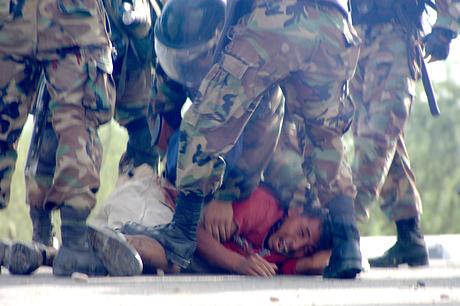Amnesty urges government to suspend laws and oil concessions
August 4, 2009
 © Marijke Deleu and Thomas Quirynen
© Marijke Deleu and Thomas QuirynenThis page was last updated in 2009 and may contain language which is now outdated.
Amnesty International has published a damning statement following a visit to Peru in the wake of violent conflict in the Amazon that left more than 30 policemen and civilians dead.
The conflict took place on June 5 after armed police were ordered to clear an Indigenous protest on a road leading from the coast into the remote rainforest. The protests had been sparked by a series of laws passed by the government threatening Indigenous rights and making it easier for outsiders to seize their territories.
‘We urge the government to suspend the laws in question until it has established a consultation process that meets international standards established by the International Labour Organisation’s Convention 169 and the UN’s Declaration of Indigenous Peoples’ Rights,’ says Amnesty’s statement. ‘As a sign of good faith, the government should not give any more concessions for the exploration and exploitation of natural resources and suspend any concessions already made that could affect Indigenous peoples’ rights.’
Amnesty’s statement also calls for 1) a ‘revision’ of the charges made against a number of Peru’s Indigenous leaders, 2) the investigation into any claim that Indigenous people ‘disappeared’ during or in the aftermath of the protests, and 3) a ‘full, impartial and independent’ investigation into the conflict.
Amnesty says that Peru’s government has a ‘huge responsibility’ for the events of June 5 – principally for its failure to consult, as stipulated by international law, the people who would be affected by the new laws. It also says that the armed forces used ‘excessive force’ and ‘indiscriminately’ shot at unarmed people, and that defenceless people, including some injured in ambulances, were ‘maltreated’.
Amnesty’s research team was in Peru between 12-24 June. Requests to meet the president, Alan Garcia, and the new prime minister, Javier Velásquen Quesquén, were not granted. ‘Amnesty was disappointed not to be able to meet the two most high-ranking officials in the government and hopes this is not indicative of the seriousness with which it is taking the grave events of June 5,’ Amnesty’s statement says.
Read Survival's eyewitness report on the June 5 violence
Watch Survival's film featuring interviews with the eyewitnesses

